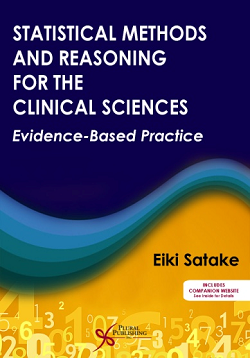 San Diego, CA – July 24, 2014 – Statistical Methods and Reasoning for the Clinical Sciences: Evidence-Based Practice provides practitioners with the scientific literacy needed to understand statistical methods in order to increase the accuracy of their diagnoses.
San Diego, CA – July 24, 2014 – Statistical Methods and Reasoning for the Clinical Sciences: Evidence-Based Practice provides practitioners with the scientific literacy needed to understand statistical methods in order to increase the accuracy of their diagnoses.
With case studies included on a companion website, this text will help readers comprehend how the process of clinical research relates to the scientific method of problem solving. Readers will understand the importance of three key, interrelated tasks involved in a research study: description (why it was done), explanation (what was done and to whom), and contextualization (how the results relate to other bodies of knowledge).
This text also examines the following:
- The two basic elements of statistical reasoning that constitute evidence-based practice: deductive inference (from effect to cause) and inductive inference (from cause to effect).
- Classical statistical methods—statistical terms/vocabulary, population parameters, and sampling methods—as well as descriptive statistical methods— measures, correlation, and regression.
- The fundamentals of statistical inference that include testing hypotheses using a z-test, t-test, ANOVA, and MANOVA.
- The concept of probability, through various concrete examples and a step-by-step approach, which is a fundamental part of the clinical decision-making process.
- Evidence-based probabilistic methods called Minimum Bayes Factor (MBF) for measuring the strength of clinical evidence more precisely and as an alternative to classical testing hypotheses methods.
- Rationales and procedures of other statistical methods frequently seen in clinical literature, like meta-analysis, nonparametric methods, categorical analyses, and single subject designs.
This text not only distinguishes between the concepts of “statistical significance” and “clinical significance,” often not clearly addressed in other texts, but it also emphasizes the value of scientific literacy in evidence-based practice.
For more information and to view sample pages visit https://www.pluralpublishing.com/publication_smrcs.htm. If you are interested in receiving a complimentary copy of this book for review in your publication, please contact Jessica Pollard aJessica@pluralpublishing.com
About The Author
Eiki Satake, PhD, is an associate professor of mathematics and statistics at Emerson College in Boston, Massachusetts. He has written numerous scholastic articles and instructional textbooks on statistical methods and statistics education. He has also conducted several research seminars and short courses on evidence-based statistics at national and international academic conferences. His research interests include Bayesian statistical methods and probabilistic approaches to evidence- based practice.
About Plural Publishing, Inc.
Plural Publishing produces leading academic, scientific and clinical publications in the fields of speech-language pathology, audiology, otolaryngology, and professional singing. Plural Publishing, Inc. aims to fill a space in the field of communication sciences and disorders with high-quality publications written by world-class experts in order to improve and enhance the knowledge base of each profession, from the classroom to clinical practice. Plural Publishing prioritizes the intellectual growth of the disciplines it serves and strives to improve and advance these fields through its publications. For more information about Plural Publishing, visit pluralpublishing.com

